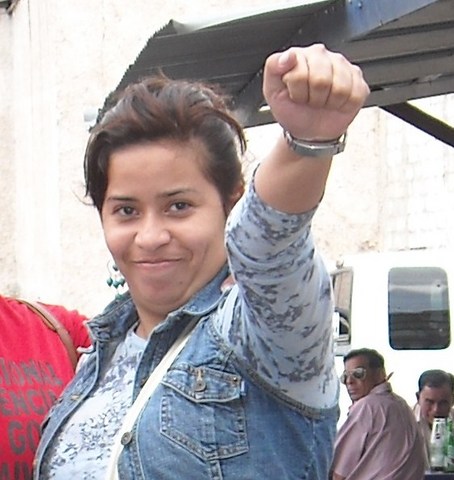WELCOME TO THE ARCHIVE (1994-2014) OF THE MAQUILA SOLIDARITY NETWORK. For current information on our ongoing work on the living wage, women's labour rights, freedom of association, corporate accountability and Bangladesh fire and safety, please visit our new website, launched in October, 2015: www.maquilasolidarity.org
February 19, 2010
The face of Honduras' president may have changed, but the impunity and repressive policies of the old coup government continue.
Porfirio Lobo took office on January 27 after winning a deeply flawed election in which over one half the county's eligible voters failed to cast their ballots. The National Popular Resistance Front called for a boycott, and most governments in the hemisphere refused to support the elections because they were held under a government installed by military coup in June 2009.
Lobo promised to form a government of "national reconciliation and unity" that would end the months of violence and political crisis that had gripped the country since the coup. Since taking office, however, he has shown little interest in reconciling with ousted president Manuel Zelaya or the National Resistance that had mobilized opposition to the coup government.

Vanessa Yamileth Zepeda, union leader, mother and nurse assassinated in Honduras
In fact, Lobo appears to be more concerned with providing safe cover to those who perpetrated the coup than with addressing the serious crimes and rights violations which occurred under the de facto regime of Roberto Micheletti.
On the day of his inauguration, while urging Hondurans to "forget the past," Lobo signed an amnesty decree which left the coup perpetrators off the hook. Although Zelaya was also included in the amnesty, he would still face corruption-related charges if he were to return to Honduras from his exile in the Dominican Republic. Zelaya accepted safe passage to that country on the day of Lobo's inauguration in order to end his months of refuge in the Brazilian embassy.
In a February press release, The Inter-American Commission for Human Rights expressed "its concern with respect to the ambiguity of the Amnesty Decree," hinting that the State could try to use it as an excuse for not investigating the human rights abuses that occurred in the months after the coup.
What's more, the Honduran Supreme Court had already cleared several high ranking military officers - including the head of the armed forces, Gen. Romeo Vazquez Velasquez - of charges related to the coup. And, just days before the inauguration, the de facto President, Roberto Michelleti, was appointed lifetime congressman by the Honduran Congress along with several other de facto government officials.
Of even greater concern are the reports that repression and violence against members of the resistance is continuing, if not escalating, under Lobo's government.
On February 4, 29 year-old Vanessa Zepeda, a member of the Social Security Union and active in the resistance, was found dead after her body was thrown from a vehicle in the country's capital, Tegucigalpa. Zepeda had reportedly been receiving death threats related to her involvement with the resistance.
Two days earlier, two cameramen from Honduras' TV Globo, who had accompanied Zelaya in the Brazilian embassy, were kidnapped by plain-clothed men identifying themselves as police. They were tied, beaten, and threatened while being interrogated about the possession and location of weapons.
Unfortunately, Lobo has failed to denounce these and other crimes, or to take a strong stand against further rights abuses under his government. Nor has the international community placed sufficient pressure on Lobo to deal with the abuses since the coup.
Instead, there are signs that countries are beginning to normalize relations with Honduras. Although only the US, Canada and a handful of other countries have recognized the elections which brought Lobo to power, some nations have begun re-deploying their ambassadors, and some previously frozen aid has been resumed.
As part of his plan to win back international support for Honduras, Lobo has been eager to show that he is complying with the letter, if not the spirit, of the October 2009 San Jose-Tegucigalpa Accord, which was intended to end the crisis. One of the terms of the Accord was the establishment of a Truth Commission. Lobo, with the support of the Organization of American States (OAS), has begun setting up this Commission and has appointed Eduardo Stein, former Guatemalan vice-president, to head it up.
But this Truth Commission has been strongly denounced by the resistance, who view it as merely another attempt by Lobo to whitewash his government. According to the resistance, Lobo has not shown openness to dialogue or to involving the resistance in the process, and instead of investigating past abuses and putting an end to the ongoing violence, he has chosen to pardon many of those responsible.
As the Committee for the Detained and Disappeared in Honduras (COFADEH) states in a February 5th communiqué, "The state terrorism implemented since June 28 against the Honduran people continues with selective crimes, political persecution and other human rights violations, in direct contradiction to the promises of reconciliation and the creation of a Truth Commission."
And according to a January 2010 report by Amnesty International on the violations that occurred since the coup, "If President Lobo wants to restore the rule of law and confidence in his government, he must ensure the abuses of the past seven months are dealt with quickly and effectively."
Meanwhile, the National Popular Resistance Front, initially created to resist the coup, continues to mobilize and reject the Lobo administration as a continuation of the de facto regime. They plan to elect delegates from the country's various municipalities and departments and hold their first National Assembly in September.